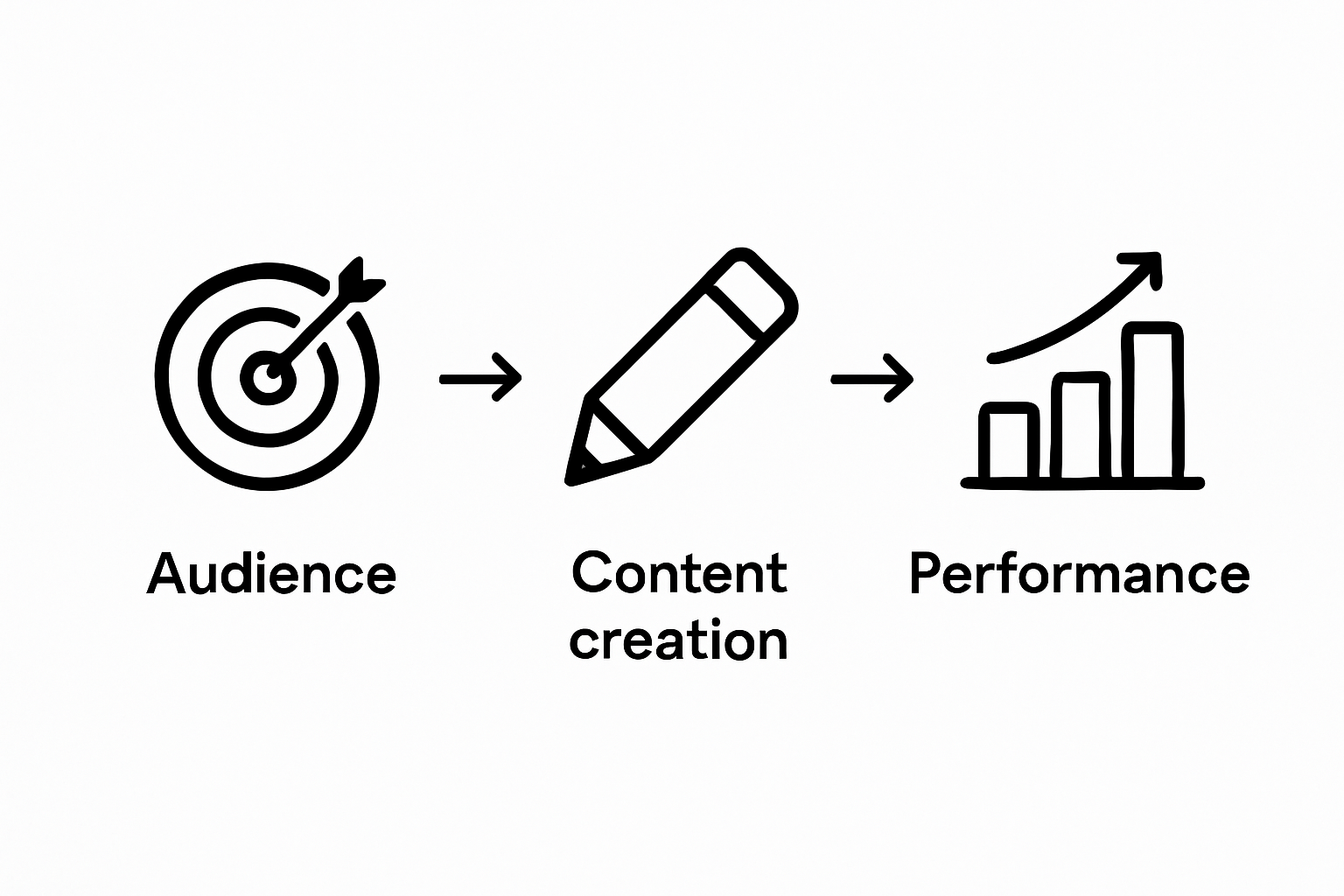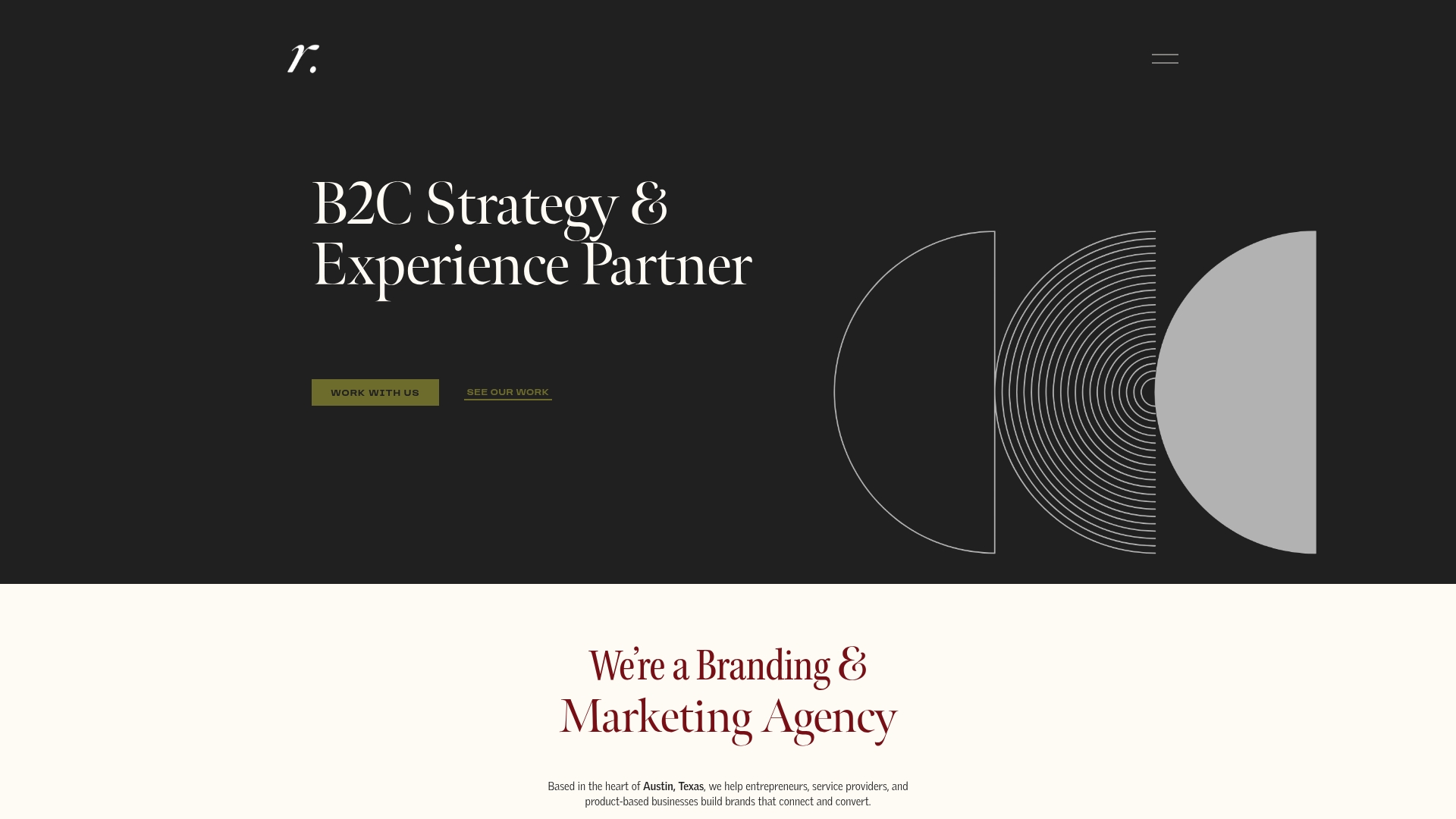What Is Rebranding and Why It Matters

Explore the content marketing framework to grasp its significance and how it can unify your marketing efforts for better results.

Content marketing sounds simple. Write some articles, post them online, and wait for customers to show up. Yet here is a surprise. Nearly 63 percent of businesses say they have no documented content strategy at all. That is where most brands get stuck, spinning their wheels instead of gaining traction. Because the real secret is not more content, it is having a smart framework that turns scattered efforts into real business results.
A content marketing framework represents a systematic approach that transforms random content creation into a strategic, purpose-driven process. Unlike traditional marketing tactics that spray messages everywhere, this framework provides entrepreneurs and businesses with a structured methodology to develop, distribute, and measure content that genuinely connects with their target audience.
At its fundamental level, a content marketing framework serves as a strategic blueprint that aligns content creation with specific business objectives. Content Marketing Institute defines it as a comprehensive system that guides organizations in producing meaningful content that attracts, engages, and converts potential customers.
The framework addresses several critical business needs:
Successful content marketing frameworks typically integrate multiple strategic elements. These components work together to create a cohesive approach that transforms content from a tactical output into a strategic business tool.
The most robust frameworks include:
By implementing a well-designed content marketing framework, businesses can move beyond random content creation and develop a purposeful strategy that drives meaningful audience engagement and supports overall business growth.
To clarify the essential building blocks of an effective content marketing framework, the table below summarizes its key components and their primary functions within strategy development.
| Component | Description |
|---|---|
| Audience Persona Development | Defines detailed profiles of target customers, including needs and motivations. |
| Content Mapping | Aligns content topics and types with customer journey stages. |
| Channel Selection & Distribution | Determines the optimal platforms and delivery methods for content. |
| Performance Tracking & Analytics | Measures content effectiveness and informs improvements. |
In the complex world of content marketing, a unified approach transforms scattered efforts into a strategic powerhouse. Without coordination, businesses risk creating disconnected messaging that confuses audiences and dilutes brand impact. A unified strategy ensures every content piece works harmoniously toward overarching business objectives.
Traditionally, marketing departments operate in fragmented channels—social media teams work separately from content creators, while email marketers pursue independent strategies. McKinsey research indicates that organizations with integrated marketing approaches achieve significantly higher performance and customer engagement.
A unified approach addresses critical challenges by:
A holistic content marketing strategy connects individual tactics into a comprehensive narrative. Instead of treating each content piece as an isolated asset, businesses can develop interconnected experiences that guide potential customers through their entire journey.
Key benefits of strategic alignment include:
By embracing a unified approach, businesses transform content from a tactical tool into a strategic instrument of growth, ensuring every communication reinforces their core brand promise and drives meaningful engagement.
Content marketing frameworks are sophisticated systems designed to transform random content production into strategic business communication. They go beyond simple content creation, providing a comprehensive approach that connects audience needs with organizational objectives.
At the heart of any robust content marketing framework lies a deep understanding of the target audience. Research Gate highlights that successful frameworks prioritize audience insights as their foundational element. This means developing detailed personas that capture not just demographic information, but psychological motivations, challenges, and content consumption preferences.
Key elements of audience-centric design include:
A content marketing framework functions as a strategic roadmap that connects individual content pieces to broader business goals. It ensures that every piece of content serves a specific purpose within the customer journey, whether that purpose is awareness, consideration, conversion, or retention.
Primary alignment strategies involve:
By integrating these core concepts, businesses can transform content from a passive communication tool into an active driver of engagement, trust, and ultimately, business growth. The framework becomes a living system that adapts and evolves with changing audience needs and market dynamics.

Content marketing frameworks transform abstract marketing concepts into measurable business outcomes. They bridge the gap between creative content production and strategic performance, enabling organizations to systematically convert audience engagement into tangible growth opportunities.
Research Gate demonstrates that structured content marketing approaches directly correlate with improved brand performance. By establishing clear measurement mechanisms, businesses can track and optimize their content strategies with unprecedented precision.
Key performance indicators typically include:
Beyond immediate marketing metrics, content marketing frameworks generate broader organizational advantages. They create systematic approaches that align content creation with overarching business objectives, transforming marketing from a cost center into a strategic revenue driver.
Strategic advantages encompass:
By implementing a robust content marketing framework, businesses can develop a sophisticated approach that turns content from a tactical output into a strategic instrument of sustainable growth, ensuring every communication reinforces core brand promises and drives meaningful audience connections.
Content marketing frameworks transcend theoretical concepts, delivering tangible results across diverse business environments. They provide structured methodologies that transform abstract marketing strategies into concrete, measurable outcomes across multiple industries and organizational scales.
Content Marketing Institute highlights how technology and professional service organizations leverage content marketing frameworks to develop sophisticated storytelling campaigns. These frameworks enable businesses to communicate complex value propositions through targeted, strategic content that resonates with specific professional audiences.
Key application areas in B2B contexts include:
In digital retail environments, content marketing frameworks provide systematic approaches to customer engagement and conversion. These frameworks help businesses move beyond transactional interactions, creating immersive content experiences that guide potential customers through sophisticated purchasing journeys.
Practical implementation strategies involve:
By implementing robust content marketing frameworks, organizations can transform their marketing from disconnected tactics to integrated, strategic communication systems that drive meaningful business growth across diverse sectors and audience segments.
This table compares the practical applications and strategic focus of content marketing frameworks across B2B technology/services and e-commerce/digital retail sectors.
| Sector | Framework Focus | Key Applications |
|---|---|---|
| B2B Technology/Services | Complex value articulation, expert-driven storytelling | Thought leadership, long-term relationship building |
| E-Commerce/Digital Retail | Immersive, personalized customer experiences | Product storytelling, multi-channel distribution |

Are you tired of scattered content that does not move your business forward? This article makes it clear that random content creation drains budgets and confuses your audience, holding back real growth. What you need is the clarity and consistency a content marketing framework brings—just like the ones outlined in the article. If you find yourself struggling to align your messaging, reach your perfect customer, or measure results, you are not alone. Many entrepreneurs and small business owners face this exact challenge.

Ready to break out of the cycle and implement a strategic content system? Reasonate Studio specializes in transforming scattered marketing efforts into cohesive, repeatable processes with measurable outcomes. Discover how The Aligned Impact Model™ can uncover your brand’s foundations and bring your marketing in sync with your business goals. Visit our homepage to get started and build a content strategy that grows your brand with purpose. Make your next marketing move your best yet—do not wait to create impact that lasts.
A content marketing framework is a systematic approach that transforms random content creation into a strategic process, ensuring content aligns with business objectives and effectively engages the target audience.
A unified approach in content marketing ensures that all content pieces work together harmoniously, enhancing brand messaging consistency and improving audience engagement while maximizing resource efficiency.
Key components include audience persona development, content mapping aligned with customer journey stages, channel selection and distribution strategies, and performance tracking mechanisms.
Content marketing frameworks drive measurable results by establishing quantifiable performance metrics that track audience engagement, conversion rates, and overall business impact, transforming marketing efforts into strategic growth tools.